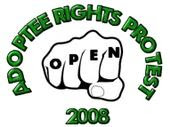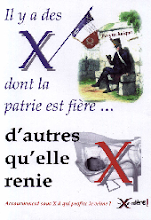
THE VIRGIN ISLANDS DAILY NEWS
July 15, 2008
Forced secrets
Court blocks mother's search for son taken from her at birth
By JOSEPH TSIDULKO
Infant Sherman, as he is named in court documents, is a 38-year-old man who may have strong family ties to St. Croix.
Aside from those facts, his biological mother knows next to nothing about the son she gave up for adoption soon after he was born.
She does not know his name.
She does not know where he lives.
She does not know whether he has a family of his own.
But she wants to know. She yearns to know.
Leslie Carter-Farington has spent the last 17 years trying to trace her son, the "Infant Sherman" who was taken from her for adoption. She wants to be reunited with the only child she ever had, and she also wants to leave him a substantial inheritance.
Carter-Farington's difficult and frustrating search has led her to the Virgin Islands, where, she discovered, the baby's adoption was finalized in 1970.
Then she hit a roadblock - possibly an insurmountable one - when the V.I. Supreme Court last month affirmed a V.I. Superior Court decision rejecting her petition to unseal the adoption records that would reveal her son's identity.
Her St. Croix attorney, Curt Otto, argued that the territory's appellate court had an opportunity to be in the vanguard of a nationwide trend toward greater openness and transparency in adoptions - a trend reflecting increasingly liberal attitudes and the lifting of social stigmas.
Otto suggested that the court appoint a guardian as an intermediary between the natural mother and the adoptive parents to avoid the possibility of an unwanted encounter. He included data from studies suggesting that the great majority of reunions are positive experiences for the person who was adopted.
The Supreme Court justices, however, agreed with the lower court that Carter-Farington's reasons for wanting access to the records - to meet her biological son and to leave him her estate - were not sufficient under V.I. law to prompt them to unseal the adoption records to the biological mother or to a guardian acting on her behalf.
Despite the court's rejection of her request, Carter-Farington still believes she will find the son she gave birth to in Miami Beach on Sept. 26, 1969, when she was a 25-year-old fashion model.
"I loved my son, I wanted my son," Carter-Farington said.
But her first husband insisted he would not raise a child, she said.
Against her wishes, she says, she caved in to her domineering husband and gave up the newborn boy - a decision she has regretted ever since.
A mother's search
Now 65, Leslie Carter-Farington is a Christian counselor with a doctorate degree in theology. She long ago divorced Infant Sherman's father, and she is happily married and living in the small town of Boerne, Texas.
But the deeply religious woman, who never gave birth to another child, says a spiritual wound has existed ever since her first husband persuaded her to give up her baby.
Carter-Farington was born Alba Leslie Ramirez-Perez in Puerto Rico. She and her husband moved to St. Thomas in the late 1960s and lived here for three years.
Back then, people in the Virgin Islands knew her by the name Abbie Sherman. She worked as a model and lived what some would consider a glamorous life. But the marriage was profoundly unhappy, Carter-Farington said.
When she became pregnant in January 1969, her marital problems worsened.
"After I let him know I was pregnant, that's when hell broke loose," she said.
On the afternoon of Sept. 26, 1969, Alba Leslie Sherman - her legal name when she lived in Florida - gave birth to a healthy 6-pound boy at Mount Sinai Medical Center in Miami Beach.
She says she had only 15 minutes with her son before the medical staff carried him off at the behest of her husband, who already had completed the necessary legal arrangements with a Florida agent to ensure that the adoption would proceed.
"I was so young and naive. I didn't know I had any rights," Carter-Farington said.
The child had blue eyes and blonde hair, Carter-Farington remembers.
She never saw him again.
"For seven years, I cried daily. It was the most difficult thing for me to do to let go of my son," she said.
"I had to cry to God and ask Him to give me comfort."
The strained marriage ended in divorce the same year Infant Sherman was born.
Alba Leslie Sherman went to visit her sister in Texas and ended up staying. She remarried in 1970.
Leslie Carter, as she became known after her marriage in Texas, founded a sporting goods store with her husband. She operated two branches until 2001, despite their divorce in 1986.
For years, she did not tell even her closest family that she had given birth to a boy in Miami so many years earlier. Keeping quiet pained her, especially when her sister had a child of her own.
In 1990, Leslie Carter married Ron Farington, her current husband.
About that time, her son should have been celebrating his 21st birthday, the age at which she believed she would be allowed access to Florida's adoption records.
"The day he was 21, I immediately sent a letter to an attorney in Florida," she said.
By that point, however, Florida's disclosure laws had changed and she was denied the information she had awaited for so long.
She hired a private investigator, but he was not successful in discovering more about the adoption or about her son's identity.
After retiring from the sporting goods business, Carter-Farington obtained her doctorate degree in 2004.
In desperation, she wrote a letter to the White House, and another to the president's brother, Jeb Bush, then governor of Florida.
The long shot proved fruitful.
In November 2004, the Florida Department of Children and Families replied to Carter-Farington at the behest of the state's governor.
"I got everything, I got all the documentations. They found out where he was adopted."
But Florida could not provide any information about her son because the adoption did not take place there. Instead, Carter-Farington learned, it was finalized June 4, 1970, in Municipal Court in Christiansted, St. Croix.
Carter-Farington hired Otto, who found records kept by the Superior Court's Family Division. A notation in a book of old case numbers read: "Adoption of Infant Sherman."
In considering the case, the territory's courts verified that they do possess Infant Sherman's adoption records.
Legal barrier
When she gave her son up for adoption, Carter-Farington signed consent documents forfeiting all rights to the child.
Virgin Islands law stipulates adoption records can be unsealed only at the request of the person who was adopted, once he or she becomes an adult, or by someone who demonstrates "good cause" - a term simply meaning the existence of an adequate legal reason for the court to take action.
Infant Sherman has not sought out his birth mother.
In February 2007, Superior Court Judge Patricia Steele denied Carter-Farington's request for the adoption records, finding that the law was clear in establishing her reasons did not amount to "good cause."
The next month, Steele denied a request to reconsider her decision.
Otto appealed to the V.I. Supreme Court, arguing Steele's interpretation of the adoption statute took into account only hypothetical interests of the parties involved in the case when determining whether "good cause" existed for disclosure.
The real interests of the parties could be known only if contact is made with Infant Sherman and his adoptive parents, he argued.
Because the specific factors that constitute "good cause" were not defined by the V.I. Legislature when it enacted the territory's adoption laws almost 50 years ago, Otto said that the case was one of first impression and that the court had a chance to essentially create new law, in accord with accepted social norms, that would set precedent for future cases.
The attorney offered a method to determine the interests of the adoptee without exposing him to a potential negative situation that the law was designed to shield him from.
That method was to appoint a guardian to access the records and contact Infant Sherman's family.
The adoptive parents, who know their son is not their biological child, then could decide whether to tell him about her desire to meet him.
They also could let him know he stands to inherit a large amount of money.
That approach would mitigate any ill feelings that might result from a meeting not desired by Infant Sherman, who may not even know he was adopted. Information obtained by the guardian would help the court determine "good cause" on a case-by-case basis, according to Otto.
The court's clarification of the law would be made in light of the territory's tolerance and "relaxed attitude toward out-of-wedlock childbearing," Otto wrote.
But the three Supreme Court justices all agreed that Steele correctly interpreted the law and that there was no reason to reverse her decision.
In her published opinion, Justice Maria Cabret wrote that the V.I. Legislature would have enacted a provision allowing for the appointment of a guardian if they intended for that process to be available to biological parents seeking their children.
Instead, Cabret wrote, the law makes clear that "good cause" must first be demonstrated before anyone can have access to records, not the other way around.
Cabret did not take into consideration Otto's references to literature regarding changing societal attitudes and psychological studies because the arguments they supported were not made to the trial court and therefore could be raised on appeal.
But she wrote that implementing a system for accommodating people in Carter-Farington's position was the province of the Legislature, not the territory's courts.
In a consenting opinion, Justice Ive Swan wrote that the biological mother's "generosity towards her son is praiseworthy and commendable."
But identifying someone for inheritance is clearly not a case for which the law allows unsealing adoption records. Nothing in the law mentions an adoptee's right to inherit from his natural parent, according to Swan.
The adoption laws represent "an unequivocal attempt to terminate the relationship between natural parents and adoptee," Swan wrote.
The laws make clear Carter-Farington's stated reasons for wanting to find her son are not substantial enough for the court to circumvent the measures taken to sever the mother-child relationship, he said.
Having reached that conclusion, Swan wrote there was no need for the court to further interpret the law to create a framework under which "good cause" could be established in such cases.
Shifting mores, happy reunions
Otto said he believes the Supreme Court's decision amounts to a missed opportunity. The territory could have been at the forefront of a national trend toward liberalizing adoption laws, something that will inevitably happen across the country in the coming years, he said.
"The reason for secrecy laws has evaporated," Otto said.
The court "had a real opportunity to take a giant step forward on behalf of all parents in the United States. The adoption laws are awaiting a progressive court," he said.
In the early 1900s, adoption records generally were open and accessible, according to Otto.
"The veil of secrecy that descended on the adoption process was created because of societal stigma and prejudices," Otto wrote in his appeal.
Those prejudices reflected society's view toward out-of-wedlock pregnancy. Back then, "adoption was viewed as somehow shameful, something to be hidden," Otto wrote.
The secrecy laws became stricter after World War II as the number of illegitimate births increased in this country. They were meant to protect children from the pejorative label of "bastard" and shield mothers from the scorn of society.
Since the 1960s, however, the pendulum of public opinion has been swinging in the other direction.
"In the law, there is a slow trend toward openness," Otto wrote. "Secrecy, however, remains the law in most jurisdictions."
To support his arguments, Otto included an affidavit from a psychologist who has studied the relationships that form between adults and the biological parents who gave them away.
In the affidavit supporting Carter-Farington's appeal, Wayne Etheridge wrote that studies overwhelmingly suggest most reunions are happy. A 1989 study concluded that 95 percent of adults who had been adopted wanted to be found by their birth parents.
According to Etheridge, 90 percent of the people interviewed for another study claimed their reunion with their biological parent proved to be a positive experience.
Psychological literature "found that the searching process to encounter birth parents helped fill a void that seems to arise from the adoption process itself," Otto wrote in his appeal.
Longing for reunion
Leslie Carter-Farington is convinced that a reunion with her son will be a day of profound joy and love.
She still believes she will meet him - someday.
When she does, she is certain she will love him, even though she knows nothing about his life.
"We are certain in our hearts that my son is a good man," she says.
Carter-Farington is a woman of faith, and her faith convinces her that "love conquers all things," she says.
Her husband has told her he will love her son as if he was his own, just as she loves her husband's two daughters.
"I have a desire, when we meet, it will be like we have never been apart. My desire is to be part of his life and him be part of our life and family," Carter-Farington says.
Link to article
-








3 comments:
The Sacred Hoop shows how all things go in a circle. The old becomes the new, the new becomes the old. Everything repeats. White people have no culture. Culture is having roots in the earth. People without culture don't exist very long, because Nature is God.
------------
charly
Alaska Alcohol Addiction Treatment
She wants to be reunited with the only child she ever had, and she also wants to leave him a substantial inheritance.
===================================
james
Maine Drug Addiction
Hi,
I really loved your blog, but it appears that you have put a lot more work into it. I will keep your blog in my twitter so I can come back and see it again when it has some new information. Good subject!
Thanks and Regards,
Fenald
Russia education
Post a Comment